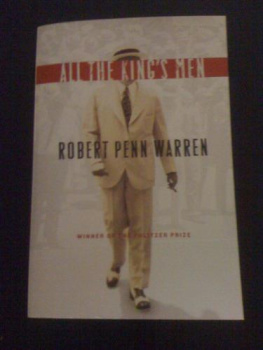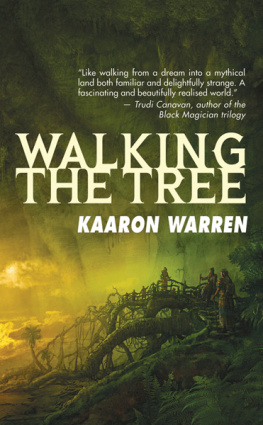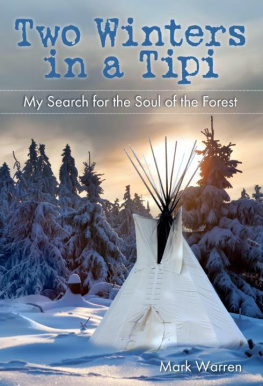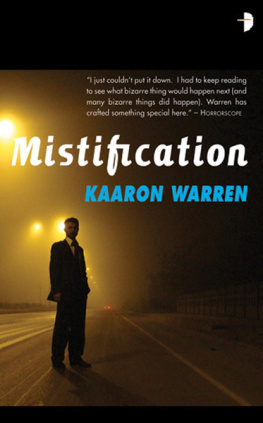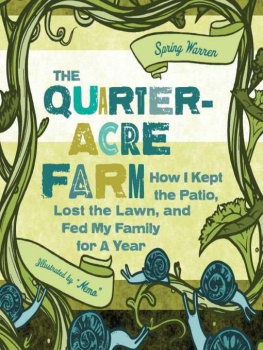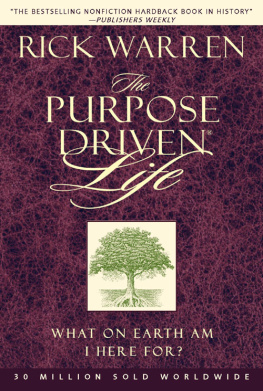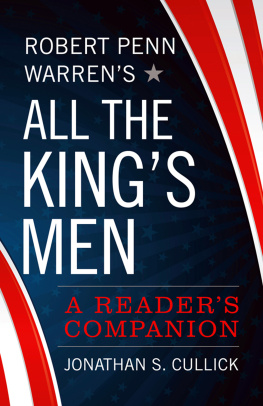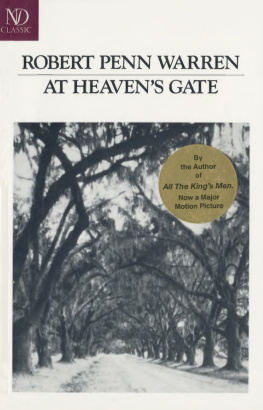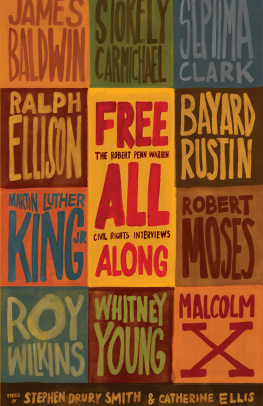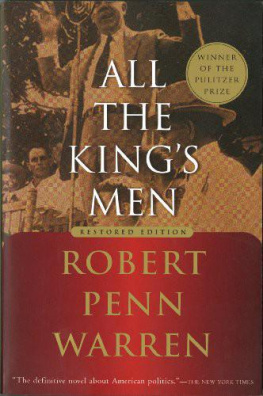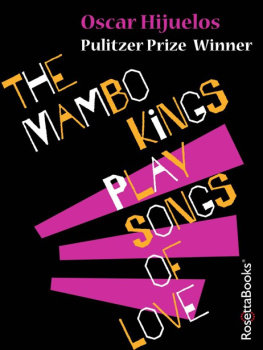Robert Penn Warren
ALL THE KINGS MEN
First Published in 1946
Justine and David Mitchell Clay
CONTENTS
All the Kings Men
Introduction to the 1974 English Edition
ALL THE KINGS MEN
Chapter One
MASON CITY
To get there you follow Highway 58, going northeast of the city, and it is a good highway and new. Or was new, that day we went up it. You look up the highway and it is straight for miles, coming at you, with the black line down the center coming at and at you, black and slick and tarry-shining against the white of the slab, and the heat dazzles up from the white slab so that only the black line is clear, coming at you with the whine of the tires, and if you dont quit staring at that line and dont take a few deep breaths and slap yourself hard on the back of the neck youll hypnotize yourself and youll come to just at the moment when the right font wheel hookers over into the black dirt shoulder off the slab, and youll try to jerk her back on but you cant because the slab is high like a curb, and maybe youll try to reach to turn off course. Then a nigger chopping cotton a mile away, hell look up and see the little column of black smoke standing up above the vitriolic, arsenical green of the cotton rows, and up against the violent, metallic, throbbing blue of the sky, and hell say, Lawd God, hits a-nudder one done done hit! And the next nigger down the next row, hell say, Lawd God, and the first nigger will giggle, and the hoe will lift again and the blade will flash in the sun like a heliograph. Then a few days later the boys from the Highway Department will mark the spot with a little metal square on a metal rod stuck in the black dirt off the shoulder, the metal square painted white and on it in black a skull and crossbones. Later on love vine will climb up it, out of the weeds.
But if you wake up in time and dont hook your wheel off the slab, youll go whipping on into the dazzle and will pass you with a snatching sound as though God-Almighty had ripped a tin roof loose with his bare hands. Way off ahead you, at the horizon where the cotton fields are blurred into the light, the slab will glitter and gleam like water, as though the road were flooded. Youll go whipping toward it, but it will always be ahead of you, that bright, flooded place, like a mirage. Youll go past the little white metal squares set on metal rods, with the skull and crossbones on them to mark the spot. For this is the country where the age of internal combustion engine has come into its own. Where every boy is Barney Oldfield, and the girls wear organdy and batiste and eyelet embroidery and no panties on account of the climate and have smooth little faces to break your heart and when the wind of the cars speed lifts up their hair at the temples you see the sweet little beads of perspiration nestling there, and they sit low in the seat with their little spines crooked and their bent knees high toward the dashboard and not too close together for the cool, if you could call it that, from the hood ventilator. Where the smell of gasoline and the burning brake bands and red-eye is sweeter than myrrh. Where the eight-cylinder jobs come roaring round the curves in the red hills and scatter the gravel like spray, and when they ever get down in the flat country and hit the new slab, God have mercy on the mariner.
On up Number 58, and the country breaks. The flat country and the big cotton fields are gone now, and the grove of live oats way off yonder where the big house is, and the whitewashed shacks, all just alike, set in a row by the cotton fields with the cotton growing up to the doorstep, where the pickaninny sits like a black Billiken and sucks its thumb and watches you go by. Thats all left behind now. It is red hill now, not high, with blackberry bushes along the fence rows, and blackjack clumps in the bottoms and now and then a place where the second-growth pines stand close together if they havent burned over for sheep grass, and if they have burned over, there are black stubs. The cotton patches cling to the hillsides, and the gullies cut across the cotton patches. The corn blades hang stiff and are streaked with yellow.
There were pine forests here a long time ago but they are gone. The bastards got in here and set up the mills and laid the narrow-gauge tracks and knocked together the company commissaries and paid a dollar a day and folks swarmed out of the bush for the dollar and folks came from God knows where, riding in wagons with a chest of drawers and a bedstead canted together and the old woman hunched on the wagon seat with a poke bonnet on her head and snuff on her gums and a young one hanging on her tit. The saws sang soprano and the clerk in the commissary passed out the blackstrap molasses and the sow-belly and wrote in his big book, and the Yankee dollar and the Confederate dumbness collaborated to heal the wounds of four years of fratricidal strife, and all was merry as a marriage bell. Till, all of a sudden, there werent any more pine trees. They stripped the mills. The narrow-gauge tracks got covered with grass. Folks tore down the commissaries for kindling wood. There wasnt any more dollar a day. The big boys were gone, with diamond rings on their fingers and broadcloth on their backs. But a good many of the folks stayed right on, and watched the gullies eat deeper into the red clay. And a handful of these folks and their heirs and assigns stayed in Mason City, four thousand of them, more or less.
You come in on Number 58, and pass the cotton gin and the power station and the fringe of nigger shacks and bump across the railroad track and down a street where there are a lot of little houses painted white one time, with the sad valentine lace of gingerbread work around the eaves of the veranda and tin roofs, and where the leaves on the trees in the yards hand straight down in the heat, and above the mannerly whisper of your eighty-horse-power valve-in-head (or whatever it is) drifting at forty, you hear the July flies grinding away in the verdure.
That was the way it was last time I saw Mason City, nearly three years ago, back in the summer of 1936. I was in the first car, the Cadillac, with the Boss and Mr. Duffy and the Bosss wife and son and Sugar-Boy. In the second car, which lacked our quiet elegance reminiscent of a cross between a hearse and an ocean liner but which still wouldnt make your cheeks burn with shame in the country-club parking lot, there were some reporters and a photograph and Sadie Burke, the Bosss secretary, to see they got there sober enough to do what they were supposed to do.
Sugar-Boy was driving the Cadillac, and it was a pleasure to watch him. Or it would have been if you could detach your imagination from the picture of what near a couple of tons of expensive mechanism looks like after its turned turtle three times at eighty and could give you undivided attention to the exhibition of muscular co-ordination, satanic humor, and split-second timing which was Sugar-Boys when he whipped around a hat wagon in the face of an oncoming gasoline truck and went through the rapidly diminishing aperture close enough to give the truck driver heart failure with one rear fender and wipe the snot off a mules nose with the other. But the Boss loved it. He always sat up front with Sugar-Boy and looked at the speedometer and down the road and grinned to Sugar-Boy after they got through between the mules nose and the gasoline truck. And Sugar-Boys head would twitch, the way it always did when the words were piling up inside of him and couldnt get out, and then he start. The b-b-b-b-b he would manage to get out and the saliva would spray from his lips like Flit from a Flit gun. The b-b-b-b-bas-tudhe seen me c-c-c and here hed spray the inside of the windshieldc-c-coming. Sugar-Boy couldnt talk, but he could express himself when he got his foot on the accelerator. He wouldnt win any debating contests in high school, but then would ever want to debate with Sugar-Boy. Not anybody who knew him and had seen him do tricks with the.38 Special which rode under his left armpit like a tumor.
Next page
